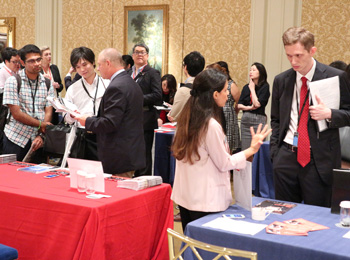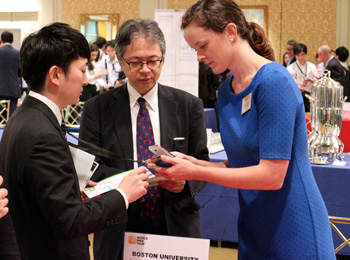|
August 20, 2018
Asia-Pacific 'boom' continues, spurred by hiring trends
Good news for those considering a potential MBA degree — in the last year, growth in MBA hiring levels has comfortably exceeded expectations, with employers in every region reporting higher-than-expected levels of recruitment according to the latest "QS TopMBA.com Jobs & Salary Trends Report."

MBAs are increasingly helping businesspeople around the world acquire necessary knowledge to succeed and expand their career options for further growth at home and abroad. QS
This has been particularly notable in the mature markets of the U.S. and Canada, and Western Europe, where modest predictions are dwarfed by 10 percent growth in both regions. In the case of the U.S. and Canada, this is a continuation of consecutive years of strong growth; predictions of more modest growth have not been borne out, though this year's figure represents a slight slowdown. Perhaps the unexpected political events that rocked the U.S. and the world have led employers to reassess their hiring needs.
In Western Europe, the repercussions of the Great Recession were felt for longer, but recent years have seen more positive figures reported by survey respondents. 2016 saw growth at a slower rate of 4 percent, with moderate expectations for 2017 — possibly on the back of political events in the U.K. Once again, the reality has been more positive, with raised expectations for next year. The figure is not huge, but the fact that it is in excess of 5 percent is notable in itself. Stronger growth across the eurozone, which outpaced the U.S. for the first time since 2008, has clearly instilled a degree of confidence at last.
However, it's when we turn our attention outside these two most-mature markets, and to the Asia-Pacific region in particular, that things get really interesting. This past year has seen the Asia-Pacific MBA boom continue, with an incredible 18 percent increase in hiring. Driven by India and China, in addition to the established markets of Japan, Australia, Singapore and Hong Kong, there seems to be an insatiable appetite for MBAs in the region.
Interestingly, we see predictions fall to match Western levels next year, which we might read as a sign of growing maturity in the region, as hiring levels reach a more sustainable level. The region's growth remains strong, however, so it would not be too great a shock to see expectations exceeded once again.
The Asia-Pacific region really has been the standout story in terms of MBA hiring for a few years now, and this year is no different, with an incredible 18 percent increase in MBA hiring. While the feeling seems to be that hiring will be at a more restrained level next year, equivalent to Western Europe and the U.S. and Canada, it is perhaps fair to say that it would hardly register shock waves if the figure posted was much higher than expected.
While technology has been the key in previous years, we see more down-to-earth figures reported this year, though next year may be better for Asia-Pacific tech employers. Consulting has had an excellent year, which may well be followed by another, while growth in financial services outpaces the West (as is also the case with overall economic growth).

MBAs are increasingly helping businesspeople around the world acquire necessary knowledge to succeed and expand their career options for further growth at home and abroad. QS
Interestingly, it is the "other" employers that really stood out in the Asia-Pacific region in 2017, showing that this maturing market is diversifying.
What an MBA can earn
As should be expected, MBA salaries vary from region to region around the world. In the Asia-Pacific region, MBA salary levels continue on a steady upward trend (though not in excess of the anomalously high figure reported in 2014), reflecting the continued growth of the region for the long term. Overall compensation is somewhat down, but this reflects the relative unpredictability of bonus levels as much as anything, with new countries and industries entering a booming, but still-young MBA hiring market.
Elsewhere in the world, this year marks a return to close to the six-figure mark for basic MBA salary in the U.S. and Canada, after last year's slight dip. Even with this taken into consideration, the spiritual home of the MBA still comfortably led the pack in salary terms last year.
This has been accentuated by this year's full return to form, a hair's breadth from 2015's record-high MBA salary figure. For those who have money on their minds, English-speaking (and French-speaking) North America is the place to go.
Bonus packages, however, are not quite as generous as previous iterations of QS MBA salary research, meaning that we see total compensation take a slight hit. With a figure that remains close to $120,000, this will hardly require any tightening of the belt.
MBA salary levels have not increased by same amount in Western Europe, nor quite recovered to the level seen in 2015 or the two preceding years (in 2013, reported levels were even within reach of the U.S. and Canada). However, the trend is positive, with a healthy figure around $85,000, pulled over the six-figure mark when bonus figures are taken into consideration. This steady growth represents a stabilization after the volatility of preceding years.

MBAs are increasingly helping businesspeople around the world acquire necessary knowledge to succeed and expand their career options for further growth at home and abroad. QS
In the Energy Efficiency and Conservation Authority, we see improved MBA salary offers tempered by stable compensation levels — a shift from a performance-related bonus to basic salary can be taken as a sign of increased confidence from employers. Unfortunately, total compensation is down somewhat from last year's figure.
We see the same phenomenon in the Middle East and Africa, where it is even more pronounced (though the trend is positive for overall compensation), although this seems more a consequence of volatility in a small employer pool. Nonetheless, the salary data reported this year show that a fine figure can be commanded in the region. Latin America leaves us with fewer talking points, but a happy story, with a slight bump in both salary and total compensation levels.
What employers want
We asked employers to tell us which skills they value the most in their MBA hires, and how satisfied they were that they were in possession of said skills. We have seen a level of consistency in this over the years — MBA employers expect a lot, and don't believe they are quite getting it. Traditionally, this has been most pronounced in soft skill areas, and this year is no different, with a noticeable disconnect between importance and satisfaction in communication skills, interpersonal skills and leadership skills.
We asked employers to also pick which MBA specializations they considered the most valuable. The results very much echo what was found above, with leadership and strategy leading the way, followed by innovation. The message for MBAs is clear; employers are looking for visionaries, not just functional managers who are able to keep things moving along. Does this sound like you?
The next step
For individuals considering an MBA who find themselves tempted by the thought of taking advantage in the increased appetite for MBAs among employers in the Asia-Pacific region, the easiest way to start speaking to schools and learning about options is to attend a QS event. Featuring representatives from top business schools around the world, the QS World MBA Tour puts everyone that prospective applicants need to speak to under one roof. To register for a place at the Tokyo tour event on Aug. 30, all information can be found at www.topmba.com/JapanTimes.
|